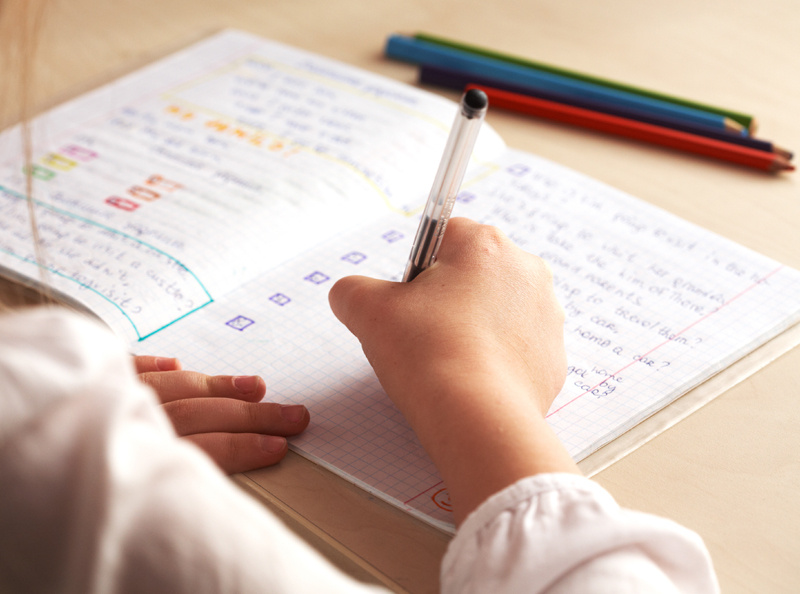
New year, new school, new opportunities for growth! Read our article as we share some tried and true tips for parents and children in the lead up to the first day of primary school.
A Whole New World Awaits
New classmates, new teachers, new school environment — your child’s tiny world is about to get a lot bigger. With these changes come opportunities for personal, social and cognitive growth.
The Countdown And Preparation Begins
In these weeks as you count down to your child’s first day of school, you may be wondering, “What will school be like for my child? Will my child be able to cope in the new environment?”
Parents can help by being proactive — research from professionals at Duke University suggests that establishing a strong communication channel with your child’s teachers helps and so does monitoring changes in your child's behaviour or mood when he or she first starts school.
Whether at home or in school, we’ve got some great tips for every stage of preparation that will help you (and your child) pave a smooth journey towards the new school term in January.
1. Create A Routine That Works
Studies have shown that routines help children feel safe and secure. Set up a routine that works for your child — whether it’s a shower before dinner or an afternoon snack before naptime, it’s important that your child gets into a routine that he or she is comfortable with.
2. Identify Friendly Figures In School
Helping your child identify teachers or staff he or she can go to for assistance is important. When your child recognises trustworthy figures of authority, he or she will feel more secure in the new environment.
Related Article: Gear Up For Primary 1
3. Prepare An 'Emergency' Fund
You may want to consider setting aside an “emergency fund” for your child. Placing extra money in a separate wallet or purse to be kept in his or her school bag means that your child will still have access to money if he or she misplaces pocket money. However, you should set some strict rules about when this money can be used.
4. Test Out That Transport Route
It may be a good idea to have a few dry runs of your child’s journey to and from school to help your child familiarise himself or herself with the route. Help your child identify key landmarks and remember the specific place where he or she will be dropped off or picked up from everyday.
Related Article: Raising A Responsible Child
5. Set Mini Goals To Achieve Together
Help to make the experience seem less daunting by setting mini goals for the first day of school. Start with small tasks like “Leave the house on time” or “Remember to bring my water bottle home” or “Meet one new friend in class today”. These mini goals give your child something to look forward to on his or her first day of school!
Download Our Special Guide To Surviving And Thriving In Primary 1
The Learning Lab would like to extend our help as you and your child are preparing for Primary 1 and the new adventures that lie ahead. Download our fun and informative guide filled with 25 great tips to help your child survive and thrive in Primary 1!
Since there are no more weighted assessments for both Primary 1 and Primary 2 students, and no mid-year examinations for Primary 3 and 5 students, how can you keep track of your child's academic progress?
Related Article: How Do MOE’s Changes Affect Your Child? Find Out about the 3 Key Phases
In this article, Dorothy Koh, our English Subject Head for lower primary programmes, shares her insights and tips on how you can track your child's progress in school.
No Formal Exams for P1s and P2s: What Does This Mean for Parents and Students?

Justin Leow, Head of Teaching Network at The Learning Lab, emphasises the importance of giving Primary 1 and 2 students the time and opportunities to learn how to communicate with their peers or to gain more independence in their day-to-day lives.
Removing exams means your child will have more time to build the right skills and knowledge to manage new components in school.
Where necessary, your child can also invest more time in practising and fine-tuning these skills.
Some parents may be worried about understanding how well their child is learning in these early years of primary school. Others may wonder if the absence of graded assessments will cause their children to miss out on key learning milestones.
As John Dewey, a philosopher and proponent of progressive education, says, “The most important attitude that can be formed is that of desire to go on learning."
Education should still be an active and constructive process that involves children, their parents and their teachers, regardless of whether there are graded assessments in place or not. This change will allow for young children embrace the joy of learning without the pressure of having to perform well in exams.
5 Tips to Keep Your Child’s Progress on Track
1. Be Proactive

Keeping in touch with your child's teachers is essential as they'll be your partners in your child's education.
Your child spends a considerable amount of time with his or her teachers in school.
Hence, establishing an open communication channel between you and your child's teachers is important in helping you understand your child's progress and learning needs.
Have conversations with teachers from different subjects and activities. You can also ask for updates on both academic and non-academic areas to guide your child’s development.
Being aware of how your child is learning in school can help you make more informed decisions on how best to support his or her learning at home.
2. Develop Good Study Habits

Build the habit of completing revision on a regular basis, so your child learns at a steady and consistent pace through the year. You can facilitate this by creating a conducive learning space at home where your child can complete his or her work.
With Term 1 coming to a close, your child can make the most of the upcoming March holidays to review what was covered in Terms 1. Without a daily school schedule to keep to, revision can be done at a more relaxed pace — your child can take the time needed to fully understand each topic and catch up on his or her weaker subjects.
To help you with this, we've put together two guides for your child. In these guides, you will find two Math and two English mini exercises on Primary 1 and Primary 2 topics respectively.
Use these exercises to gauge your child’s ability to manage school work independently.
As part of revision, you can also go through your child's past assignments or quizzes again together. This helps your child understand why mistakes were made. You can also share tips on how to avoid making these same errors in the future.
3. Set Goals

Help your child learn to manage his or her own learning progress by setting goals — it's not too late!
One way is to keep a learning diary — this is a great way to help your child develop a sense of ownership and responsibility towards his or her learning.
Giving your child key milestones to achieve along the way helps him or her become a more reflective learner who is aware and appreciative of what he or she is learning at every step.
Goal setting is also linked to your child’s motivation, as motivation comes from adopting a specific mindset. By getting your child to think about what he or she wants to achieve (i.e. setting goals) and the specific plans he or she has to achieve them, your child will develop the confidence to follow through on those plans and find success.
Your child should be empowered to believe there is room for improvement and that the process of learning is as important as his or her achievements.
4. Keep Your Child Motivated

At home, find things to do together with your child. This can be through doing household chores together or simply asking about or his or her day over dinner.
As a parent, you play an important role in helping your child build a positive attitude towards learning and improving. You can encourage your child by:
- celebrating any improvement (big or small) that your child has made
- acknowledging the effort that your child has put in, no matter how he or she has performed in relation to your expectations
Joyce Koor, Subject Head for English at The Learning Lab, Rochester Mall, adds, "A compliment that acknowledges your child's effort helps your child develop self-awareness in reaching his or her personal best. When you acknowledge the improvement that your child has made, it builds confidence and motivates him or her to continue seeking progress in his or her work."
Giving your child an adequate amount of support and motivation is integral in helping them achieve their goals. Words of affirmation can go a long way in helping your child see that his or her effort at each stage of progress is meaningful.
5. Build Resilience

Encourage your child to keep an open mind and be positive about the feedback from peers or teachers in order to learn and improve. Helping your child see the bigger picture can be difficult, especially because of his or her young age.
With resilience, your child will be able to:
- remain optimistic about seeing through difficult tasks
- respond positively to constructive feedback
- see failure as a lesson learnt for future successes
You can start building resilience by giving your child more opportunities to solve his or her own problems. This will help your child realise that he or she has some level of control even in unfavourable situations.
For example, when faced with a challenging Math question, don’t be too quick in offering your child with solutions. Encourage him or her to keep trying independently.
There is a difference between your child thinking“I can’t do this Math problem sum, it’s too hard,” and, “This problem sum is difficult, but Ms Tan told me that I’ve learnt the topic well, so I am going to apply what I know. If I can’t solve it on my own, I can choose to ask for help.”
At the end of the day, it's about getting your child to welcome new challenges, believe in his or her own abilities and continue to press forward to achieve success.
Click here to discover how we can provide the right curriculum and support that your child needs to ensure that he or she stays on the right track.
The Learning Lab is now at locations. Find a location that suits your needs.
If you have any questions about our programmes, please email us at enquiry@thelearninglab.com.sg or call us at 6733 8711 and we will be happy to assist you.





